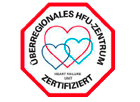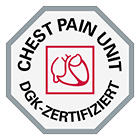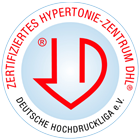Healthy living
A healthy lifestyle is the best way to prevent heart disease, while in patients with heart disease a healthy lifestyle will also help recovery. We have our hearts set on ensuring you can live a healthy life. This section will tell you what it is you can do to keep your heart healthy.
Prevention
The Brandenburg Heart Center forms part of the German Network of Health Promoting Hospitals. As such, the hospital's focus is not just restricted to the diagnosis and treatment of acute and chronic heart disease, but also encompasses the prevention of cardiovascular disease.
The fact that we set great store by the management of cardiovascular risk factors stems from the fact that these risk factors not only facilitate the development of cardiovascular disease, but are also responsible for cardiovascular disease developing at an increasingly early stage.
The most important modifiable risk factors traditionally associated with cardiovascular disease are:
- Smoking
- Diabetes
- Arterial hypertension
- Abnormalities in lipid metabolism
- Obesity
10 Healthy Heart Rules
Just follow these 10 rules and you will be helping your heart.
1. Aim for a healthy weight

The number of people considered overweight or obese is steadily increasing, both within Brandenburg and in the rest of Germany. Excess weight is associated with an increased risk of developing cardiovascular disease, abnormalities in lipid metabolism, diabetes, high blood pressure, arthritis and cancer. A body mass index (BMI) of between 18.5 and 25 indicates ideal weight if it is combined with a waist circumference of less than 80 cm in women and less than 94 cm in men. A healthy diet should be combined with a sufficient amount of physical exercise, with the aim of making permanent changes that can gradually become part of the patient's daily routine. Short-term dietary changes such as those made as part of an unbalanced diet will prove a lot less beneficial than permanent changes to your lifestyle.
It is part of our role as a Health Promoting Hospital to support patients who are obese in managing their weight. There is only one effective way to achieve weight reduction: permanent changes have to be made in the patient's levels of activity. The target of these changes is to achieve an active and balanced lifestyle, which will need to go hand in hand with improvements to the patient's diet. In short, become more active and eat more healthily.
This is the approach offered by MOBILIS, an interdisciplinary training program that is on offer at the Brandenburg Heart Center. The Heart Center is an official MOBILIS training center and has run several successful courses already. Sessions are organized in cooperation with the Brandenburg Heart Center, which is also where some of the classes are based.
For further information and to register, visit: www.mobilis-programm.de
2. Give up smoking

Smoking is associated with a considerable reduction in life expectancy. The fact that smoking accelerates the aging process also affects the blood vessels, which in turn leads to damage to the heart, lungs and brain. Smoking facilitates the development of almost all types of cancer. Additionally, smokers not only develop cardiovascular disease at an earlier age but usually develop more severe forms of cardiovascular disease. In spite of this, smokers constitute a total of 30% of men and 21% of women over the age of 15 in Germany (please refer to the "micro census" 2009). Giving up smoking halves your risk of having a heart attack or a stroke. It is usually a good idea to set a date on which to quit smoking. Should you find it impossible to stop smoking on your own, there is a lot of support available to help you quit. This may include nicotine patches or special courses. It is also a good idea to set clear targets.
The Brandenburg Heart Center is a Health Promoting Hospital and as such is smoke-free. Smoking is not permitted in the hospital or within its grounds. In the interest of patient health we would therefore kindly request that you refrain from smoking while on hospital grounds.
Many smokers are unhappy with the effect that their addiction has on their lives and wish to quit smoking, and we are happy to provide the support you need to help you quit smoking. The Brandenburg Heart Center supports smoking cessation by offering group therapy courses that are run by clinical psychologists. Inpatients can of course speak to a member of our Nursing and Care Team at any time. We will then be able to provide you with the relevant contacts for smoking cessation courses. To register, please contact Daniela Zacharias on 03338-694-925

3. Keep active
As little as 15 minutes' worth of exercise, 6 days a week will reduce your risk of dying of cardiovascular disease by as much as 20%. Naturally, the general rule is: the more active, the better - without going overboard.
Try to stick to an exercise program that includes moderate aerobic exercise such as walking, swimming or cycling. You should also try and take long walks, getting plenty of fresh air at the weekends. This will benefit not only your physical health but also your mental wellbeing and your general outlook on life.

4. Eat healthily
Animal fats are bad for the heart. The "Mediterranean diet", which reduces the risk of developing cardiovascular disease, is therefore considered an ideal alternative and is based on a few very simple principles: saturated fats are replaced by polyunsaturated and monounsaturated fats. The main ingredients in your diet should be vegetables, legumes and fruit, combined with smaller portions of grains and low-fat dairy products with meat being replaced with fish. This type of diet is certainly not lacking in flavor. In fact eating healthily can be a veritable pleasure!

5. Don't use less seasoning - just use less salt
Try not to exceed five to six grams of salt per day. Replacing salt with other types of seasoning will not make food less flavorsome, especially if replaced with aromatic herbs such as rosemary, oregano, bay leaves, thyme and parsley, or spices such as saffron, nutmeg and chili, as well as garlic, onions, capers and lemons.
It is also important to be aware of hidden salt in products such as ham, cured meats and ready meals. A low-sodium diet has been proven to lower blood pressure and is known to be beneficial for heart health.
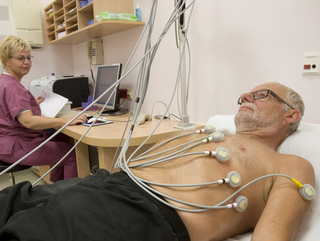
6. Take care - of yourself
In many cases, heart disease develops over many years without any discernible symptoms. This is why you should visit your general practitioner on a regular basis and have your blood pressure checked. Since 1989, statutory health insurance providers in Germany have been funding health checks for adults aged over the age of 35, known as the "Gesundheits-Check-up 35+".
This program means that adults over the age of 35 who are insured with a statutory health insurance provider can have a free health check every two years. This health check consists of a screening test for cardiovascular disease, as well as including an in-depth discussion about your medical history and a thorough physical examination. As part of this examination, you will have your blood pressure taken, as well as having your cholesterol and blood sugar levels tested.

7. Good friends are good for your health
Healthy relationships can keep you healthy. It's not always easy to maintain good relationships but it is definitely worth the effort, as having friends can help lower your risk of having a heart attack. Talking to a friend or even just spending a relaxed evening with someone can help reduce levels of stress. People who have had a heart attack and are in a happy and supportive relationship halve their risk of having another heart attack. Good relationships with both friends and family provide much needed support that can help us cope with difficult life situations. Those who find it a little more difficult to make new friends may find that joining a club or a support group can help make things easier.

8. Avoid stress
The majority of people will find it difficult to avoid stress completely, but it is advisable to try and ensure that there is a balance between moments of stress and moments of relaxation. Stress makes people ill. It causes high blood pressure, headaches and insomnia, as well as contributing to heart attacks and depression. The first step is to identify sources of stress and look for solutions to any personal problems you might be experiencing. Taking time out - in whatever way - is also a good idea, not least because it allows us to switch off. While exercise is the most effective way of reducing levels of stress hormones, courses that offer more gentle forms of exercise and/or mental relaxation, such as yoga and tai chi, can also act as an antidote to daily stressors.

9. Think positively
People who are depressed, have a pessimistic outlook on life, engage in negative thinking and who are being plagued by fears, worries or hostile feelings are at an increased risk of developing heart disease. This risk is reduced in people who have an optimistic outlook on life.
A recent study conducted at the Harvard School of Public Health suggests that factors such as life satisfaction and happiness can benefit heart health. People who have a more optimistic outlook on life also benefit from synergistic effects, as they also tend to exercise more and eat more healthily.
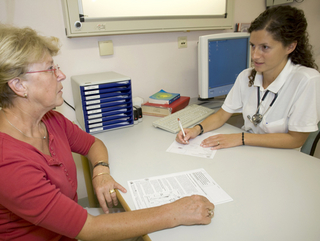
10. Listen to your doctor
Your treatment can only be successful if you follow the advice and instructions given to you by your physician. Compliance is vital, and this includes taking your tablets regularly as well as adhering to the recommended dosing schedule and timing of doses. Patients who have to take tablets at different times during the day tend to deviate from these recommendations.
This can have adverse effects on the effectiveness of the medication, as well as leading to other side effects.
If your medication does not agree with you, you should discuss this with your physician. There is usually an alternative available, and you can work with your physician to compile a treatment regimen that suits your needs. It is essential that you comply with all other instructions from your doctor as well. This may include advice regarding follow-up appointments or other measures aimed at improving heart health.


